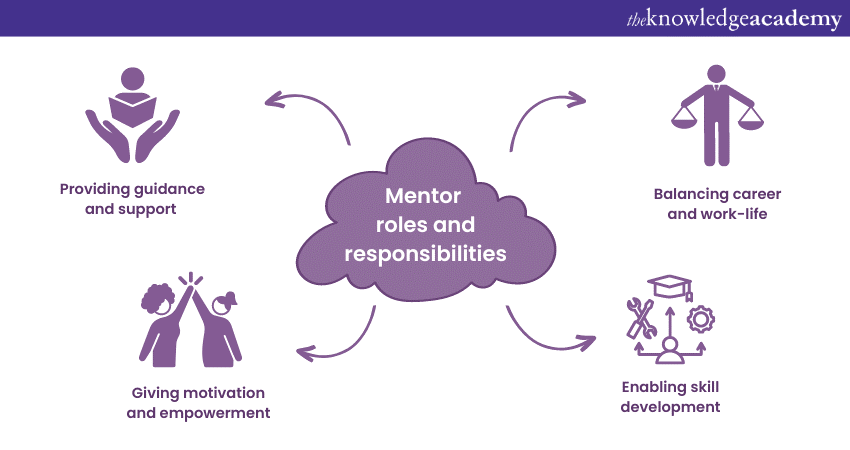We may not have the course you’re looking for. If you enquire or give us a call on +353 12338944 and speak to our training experts, we may still be able to help with your training requirements.
Training Outcomes Within Your Budget!
We ensure quality, budget-alignment, and timely delivery by our expert instructors.

A Mentor is a beacon of guidance and support, helping individuals navigate their personal and professional journeys with clarity and purpose. The Role of a Mentor is paramount in unlocking one's true potential. They are more than just advisors; Mentors inspire, motivate, and empower their Mentees to achieve their goals and aspirations.
Having a Mentor can be a transformative experience, offering unique insights, knowledge, and perspectives that accelerate growth. The importance of a Mentor lies in their ability to provide constructive feedback, celebrate successes, and offer a steady hand during setbacks. Implementing a Mentoring Action Plan can further enhance the effectiveness of this relationship, ensuring structured progress and measurable outcomes.
Table of Contents
1) What is the Role of a Mentor?
2) Guidance and support
3) Motivation and empowerment
4) Skill development
5) Career and work-life balance
6) Conclusion
What is the Role of a Mentor?

In this modern, hyper-competitive age, the distinction between Coaching vs Mentoring is essential. A Mentor plays a pivotal role in an individual's life. They provide guidance, act as a strong support mechanism, and help individuals realize their potential and achieve their goals.
The knowledge, advice, and resources that a mentor shares with their mentee depend on the format and goals of their mentoring relationship, highlighting the diverse Benefits of Mentoring. The mentor may provide guidance, motivation, emotional support, and may even become a better role model.
They may help the mentee explore career options, set goals, develop contacts, and identify resources. The mentor's role may change as per the mentee’s needs. Some mentoring relationships are part of structured programs with specific expectations and guidelines, while others are more informal. Understanding the Types of Mentoring and the benefits of mentoring allows individuals to appreciate the depth and versatility of the support and guidance provided in such relationships.
Guidance and support
Mentors provide guidance and support to their Mentees and offer assistance that nurtures growth and resilience. They carry out the following responsibilities:
a) Providing guidance and support: Mentors offer valuable advice and assistance, sharing their knowledge and experience to help their Mentees make informed decisions and overcome challenges.
b) Setting clear goals: A Mentor collaborates with their Mentee to define specific and achievable objectives, providing direction and focus to their personal and professional endeavours.
c) Offering constructive feedback: Mentors provide feedback on the Mentee's performance, highlighting areas for improvement and acknowledging their achievements, While fostering continuous growth.
Discover the Difference Between Coaching and Mentoring to choose the best path for your development.
Motivation and empowerment
Mentors play a vital role in igniting the flame of confidence and motivation, empowering mentees to embrace challenges, believe in themselves, and strive for greatness. Their roles in motivating and empowering their Mentees are as follows:
a) Building confidence and motivation: Mentors act as cheerleaders, inspiring and motivating their Mentees to believe in themselves and their abilities, instilling the confidence to tackle challenges.
b) Acting as a role model: By leading and setting up an example, Mentors demonstrate positive values and qualities, providing inspiration and guidance for their Mentees.
c) Celebrating success together: Mentors share in their Mentees' accomplishments, reinforcing their bond and encouraging further excellence.
d) Providing encouragement during setbacks: Mentors offer unwavering support and encouragement during tough times, reminding their Mentees that failures are stepping stones to success.
Get familiarised with effective coaching by signing up for our Coaching Skills Course now!
Skill development
A Mentor's guidance goes beyond knowledge-sharing. It encompasses cultivating skills and abilities, empowering Mentees to unlock their potential, develop Critical Thinking, and navigate the path to personal and professional growth. The roles they play in skill development are as follows:
a) Developing networking skills: Mentors help Mentees build valuable connections and teach effective networking strategies to open new opportunities.
b) Cultivating problem-solving abilities: Mentors encourage critical thinking and Problem-Solving Skills, enabling Mentees to tackle challenges with a positive mindset.
c) Fostering personal growth: Mentors identify strengths and weaknesses, guiding Mentees towards personal development and self-improvement.
d) Instilling responsibility and accountability: Mentors teach Mentees the importance of taking ownership of their actions and decisions, instilling a sense of responsibility and accountability.
Career and work-life balance
Mentors hold the key to shaping career paths and nurturing a harmonious work-life balance, guiding Mentees towards fulfilment and well-being on both personal and professional fronts. The roles they fulfil in career and work-life balance are as follows:
a) Offering career guidance: Mentors provide insights into different industries, suggest potential career paths, and offer advice on professional development.
b) Encouraging work-life balance: Mentors emphasise the significance of maintaining a healthy work-life balance, ensuring overall well-being and productivity.
Ready to level up your skills and unlock your full potential? Enroll now in our Mentoring Training Course and embark on a transformative learning journey!
Conclusion
The Role of a Mentor is profound in everyone’s life, as it is a heartfelt journey of transformation. They offer unwavering support to celebrating triumphs and embracing setbacks, inspiring a profound sense of belief and empowerment within their Mentees. Hopefully, this blog was able to convey how the influence of Mentors in one’s life is not limited to just being an individual with more experience but also a guiding hand with a compassionate heart. They help you unlock your true potential.
Ready to enhance your leadership skills? Enroll in our Coaching and Mentoring Training Course today!
Frequently Asked Questions
Upcoming Business Skills Resources Batches & Dates
Date
 Train the Trainer
Train the Trainer
Fri 8th Nov 2024
Fri 13th Dec 2024
Fri 21st Feb 2025
Fri 25th Apr 2025
Fri 20th Jun 2025
Fri 15th Aug 2025
Fri 17th Oct 2025
Fri 19th Dec 2025
 Halloween sale! Upto 40% off - Grab now
Halloween sale! Upto 40% off - Grab now







 Top Rated Course
Top Rated Course



 If you wish to make any changes to your course, please
If you wish to make any changes to your course, please


